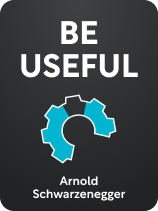

This article is an excerpt from the Shortform book guide to "Be Useful" by Arnold Schwarzenegger. Shortform has the world's best summaries and analyses of books you should be reading.
Like this article? Sign up for a free trial here.
Are you afraid to do hard work? What are the benefits of tackling difficult tasks?
The transformative power of hard work can shape you into your best self. Not everything in life will be easy, but getting through the struggle is worth it in the end.
Here’s how to do hard work to see the results.
Do the Work
Arnold Schwarzenegger’s perspective underscores that work isn’t simply a means to an end, but is integral to taking pride in your accomplishments, and that while it’s demanding, it’s necessary for making real progress. Furthermore, making the most of the work you put in requires showing commitment and adhering to high standards.
Schwarzenegger extols the value of learning how to do hard work, which he says is about more than just reaching your immediate goals. Hard work is the engine that drives you to appreciate any achievement, no matter how small. Imagine climbing a mountain without having to struggle—would you value your accomplishment as much as if you fought for every inch you gained reaching the summit? Probably not. The truth is that struggle itself gives value to what you’ve accomplished. Moreover, hard work prepares and perfects your skills for when it counts, molding you into an expert who performs at your best regardless of the situation.
(Shortform note: Many writers agree with Schwarzenegger that hard work is necessary for you to appreciate your accomplishments, but not everyone is sure that hard work is sufficient. In The Power of Moments, Chip and Dan Heath suggest that hard work alone isn’t enough to create feelings of satisfaction—we want the results of our struggles to be noticed. This isn’t something we can guarantee for ourselves, but it’s a form of recognition we can provide for others when we take the time to lift other people up, as we’ll cover later in this guide. In the meantime, remember that your hard work has value, even when what you’re working for still seems to be far away.)
Don’t look for immediate results or an easy payoff when working toward your goals. Schwarzenegger writes that you should never expect hard work to be exciting or comfortable, because it won’t be. Hard work requires tremendous effort and a lot of repetition that at times will feel grueling and monotonous. But remember: That very discomfort you feel indicates that you’re making progress because it shows that you’re pushing beyond your comfort zone, improving your skills, and making them second nature—ready to serve when they’re needed the most.
(Shortform note: The difficulty you feel when you try to leave your comfort zone may actually be a product of your ego. In You Are a Badass, Jen Sincero explains that your ego creates comfort zones as a mechanism to protect you from potential harm—in this case from embarrassment due to the derision of others. Your ego, in a way, acts like an overprotective parent who keeps you from taking risks or stepping outside of familiar territory. These barriers your ego imposes may be comforting, but they limit growth. If you try breaking free, your ego resists, creating even more emotional hurdles in an attempt to maintain the status quo. Therefore, the progress Schwarzenegger recommends involves pushing against your ego.)
Commit to the Work
When working toward your dreams, you have to commit wholeheartedly. Half-baked efforts won’t yield the results you want, and it may make the difference between realizing your dream and falling short. However, Schwarzenegger suggests that wholehearted commitment goes beyond merely giving your best effort—it also means not holding back on the scale of your ambitions. In other words, dream big! Then if you fail to reach your grand ambitions, you’ll likely achieve success to some smaller degree. Don’t do yourself the disservice of setting small targets, and if you’ve charted a course toward a particular dream, resist the temptation to give yourself a backup plan—such thinking can only undermine progress toward your primary goal.
(Shortform note: In The 12-Week Year, Brian P. Moran agrees with Schwarzenegger that total commitment is vital to executing your plans to follow your dreams. However, Moran goes on to spell out four necessary components to developing a strong sense of commitment. First, you must have a strong desire to act—your emotional connection to your goal can’t be weak. Next, you have to understand what key actions will bring you to your goal. You have to consider the cost of commitment before you agree to make sacrifices—otherwise, they might derail your progress if you haven’t thought about them in advance. Lastly, you have to ignore your negative feelings when following through on your commitments becomes hard.)
Schwarzenegger writes that hard work in practice and preparation is only half of what you need. The other side of wholehearted commitment is to carry through on what you start to the end. He illustrates this by recounting when, as California’s governor, he made sure emergency response agencies rigorously practiced their wildfire protocols. When actual fires ravaged the state, he rolled up his sleeves and continued to work, identifying where the existing plans fell short and adapting them to fill in the gaps. Going through the motions in practice would mean nothing if Schwarzenegger didn’t bring the same commitment he devoted to his prior careers—a refusal to settle for anything less than an all-out effort from himself and his team.
(Shortform note: Following through on your commitments also means being ready to do so repeatedly if needed. For instance, though Schwarzenegger only writes about one instance of wildfires that he had to manage, California endured repeated fire disasters during his tenure as governor. In 2007, Schwarzenegger positioned himself at the forefront of the relief efforts, maintaining a positive and proactive image. In 2009, Schwarzenegger declared a state of emergency as another wildfire unexpectedly grew in Santa Barbara, forcing 14,000 people to evacuate. The next year, Schwarzenegger issued an executive order to increase California’s wildfire preparedness, increasing the state’s ability to follow through on protecting its citizens.)

———End of Preview———
Like what you just read? Read the rest of the world's best book summary and analysis of Arnold Schwarzenegger's "Be Useful" at Shortform.
Here's what you'll find in our full Be Useful summary:
- Arnold Schwarzenegger’s unique perspective on success
- Why Schwarzenegger gravitated toward a life of public service
- How to treat life as a cooperative game and lift others up with your efforts






